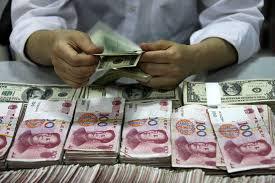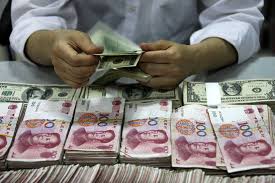
The People's Bank of China , the national bank, and Chinese budgetary establishments sold a net $25.2 billion in remote trade a month ago as they protected the renminbi.
The month prior to, the coin was obviously running the other way. In February, the PBOC and banks obtained a net 42.2 billion yuan, recommending the "redback," as some now call it, was stronger then.
February may be no abnormality as the Chinese coin is on a rise of sorts. Friday, the national bank set its every day reference rate at the largest amount subsequent to the center of January. So far this year, the cash is up 0.4% against the dollar, in the wake of falling 2.5% last year.
So the yuan, in spite of baffling monetary news, looks versatile. At a public interview on Thursday, Guan Tao, leader of the Department of InternationalPayments of the State Administration of Foreign Exchange, expressed the legislature won't erect measures to hinder capital leaving China. In the expressions of the official China Daily, Guan said late surges "have been inside desires."
Most experts concur with SAFE's sure sounding evaluation. Yet Carlo Reiter of Beijing-based J Capital Research has an alternate take. In an exploration note issued on the 23rd, he contends the PBOC sold between $56 billion to $106 billion in outside trade in February to ensure the renminbi.
His rationale is straightforward. The national bank, unless it needs to therapist the cash supply, needs to give out extra supports at whatever point it offers dollars for yuan. As he clarifies, for every dollar the PBOC offers, it takes around 6.2 yuan unavailable for general use. Reiter then totaled up the organization's giving, particularly through its less-straightforward channels, the Medium-Term Lending Facility and the Standing Lending Facility. "PBOC intercessions are being attempted stealthily, twisting business sector signals," Reiter composes.
This recommends the yuan, in actuality, is under serious weight. In the event that in February the national bank blazed as much as $106 billion, then in March it needed to experience considerably more remote trade in light of the fact that its clear there was a checked crumbling in China's position that month. First off, the outside trade resources of the People's Bank of China, as indicated by authority sources, fell 252 billion yuan in Q1, and 231 billion yuan of that decrease happened in March. For another, SAFE keeps up that March saw the greatest capital outpouring in any event a year.
So what amount of is SAFE holding in the country's outside trade saves? In the wake of tumbling a record $113 billion in the simply finished quarter, Beijing reports there is $3.73 trillion left.
That figure, in any case, appears to be too high. In March, surges of capital expanded thus did the estimation of the renminbi against the dollar. That implies, more likely than not, national bank mediation soar amid the month. Provided that this is true, China's stores are under expanding weight. Also, as a Bloomberg headline asks, "If China Sees Capital Outflows Now, What Happens in Crisis?"
Emergency? Few think one is impending. Frederic Neumann of HSBC, for occurrence, does not see "systemic danger." "They do have capital controls by the day's end it is not that simple to take cash out," he said to Bloomberg. China has a portion of the hardest capital controls on paper, yet cash surged into China in past years when speculators thought the nation was a no-lose recommendation. Since covetousness is transforming into apprehension, its impossible authorities will be more ready to stop illicit coin streams.
Regardless of the fact that China's outside trade stores are as expansive as Beijing reports—far-fetched and regardless of the possibility that all the property are as fluid as guaranteed to be—additionally suspicious China can smolder through its huge heap of forex speedier than anybody can now envision. In a year or two the hill of dollars, euros, and yen can be drained.
"Why does the PBOC need to loan to the banks past ordinary open business operations, and why does the loaning need to be secretive?" Reiter asks in his note. His firm obviously thinks the answer is that the PBOC is spending about $100 billion every month to shield the cash.
Also, Beijing, it seems, does not need us to realize it.
References:
http://www.forbes.com/sites/gordonchang/2015/04/26/is-china-spending-100-billion-a-month-defending-the-yuan/
The month prior to, the coin was obviously running the other way. In February, the PBOC and banks obtained a net 42.2 billion yuan, recommending the "redback," as some now call it, was stronger then.
February may be no abnormality as the Chinese coin is on a rise of sorts. Friday, the national bank set its every day reference rate at the largest amount subsequent to the center of January. So far this year, the cash is up 0.4% against the dollar, in the wake of falling 2.5% last year.
So the yuan, in spite of baffling monetary news, looks versatile. At a public interview on Thursday, Guan Tao, leader of the Department of InternationalPayments of the State Administration of Foreign Exchange, expressed the legislature won't erect measures to hinder capital leaving China. In the expressions of the official China Daily, Guan said late surges "have been inside desires."
Most experts concur with SAFE's sure sounding evaluation. Yet Carlo Reiter of Beijing-based J Capital Research has an alternate take. In an exploration note issued on the 23rd, he contends the PBOC sold between $56 billion to $106 billion in outside trade in February to ensure the renminbi.
His rationale is straightforward. The national bank, unless it needs to therapist the cash supply, needs to give out extra supports at whatever point it offers dollars for yuan. As he clarifies, for every dollar the PBOC offers, it takes around 6.2 yuan unavailable for general use. Reiter then totaled up the organization's giving, particularly through its less-straightforward channels, the Medium-Term Lending Facility and the Standing Lending Facility. "PBOC intercessions are being attempted stealthily, twisting business sector signals," Reiter composes.
This recommends the yuan, in actuality, is under serious weight. In the event that in February the national bank blazed as much as $106 billion, then in March it needed to experience considerably more remote trade in light of the fact that its clear there was a checked crumbling in China's position that month. First off, the outside trade resources of the People's Bank of China, as indicated by authority sources, fell 252 billion yuan in Q1, and 231 billion yuan of that decrease happened in March. For another, SAFE keeps up that March saw the greatest capital outpouring in any event a year.
So what amount of is SAFE holding in the country's outside trade saves? In the wake of tumbling a record $113 billion in the simply finished quarter, Beijing reports there is $3.73 trillion left.
That figure, in any case, appears to be too high. In March, surges of capital expanded thus did the estimation of the renminbi against the dollar. That implies, more likely than not, national bank mediation soar amid the month. Provided that this is true, China's stores are under expanding weight. Also, as a Bloomberg headline asks, "If China Sees Capital Outflows Now, What Happens in Crisis?"
Emergency? Few think one is impending. Frederic Neumann of HSBC, for occurrence, does not see "systemic danger." "They do have capital controls by the day's end it is not that simple to take cash out," he said to Bloomberg. China has a portion of the hardest capital controls on paper, yet cash surged into China in past years when speculators thought the nation was a no-lose recommendation. Since covetousness is transforming into apprehension, its impossible authorities will be more ready to stop illicit coin streams.
Regardless of the fact that China's outside trade stores are as expansive as Beijing reports—far-fetched and regardless of the possibility that all the property are as fluid as guaranteed to be—additionally suspicious China can smolder through its huge heap of forex speedier than anybody can now envision. In a year or two the hill of dollars, euros, and yen can be drained.
"Why does the PBOC need to loan to the banks past ordinary open business operations, and why does the loaning need to be secretive?" Reiter asks in his note. His firm obviously thinks the answer is that the PBOC is spending about $100 billion every month to shield the cash.
Also, Beijing, it seems, does not need us to realize it.
References:
http://www.forbes.com/sites/gordonchang/2015/04/26/is-china-spending-100-billion-a-month-defending-the-yuan/


 China’s pricing the Yuan
China’s pricing the Yuan




 Companies
Companies